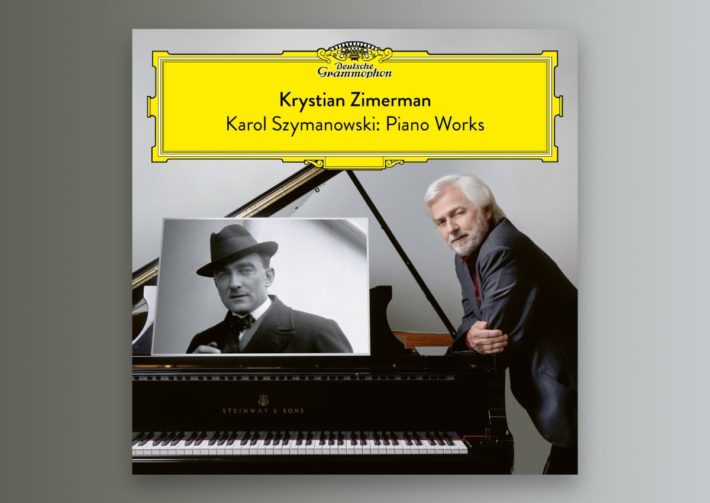Krystian Zimerman’s Szymanowski journey spans almost three decades, dating back to the mid-1990s—but while we may immediately draw parallels to Chopin via works like the Mazurkas, the pieces Zimerman has chosen aim to shed new light on the composer’s dynamic compositional style.
The Op. 9 Preludes, as early works, stylistically reflect the Chopin influence. However, there is a pull toward divergence: while Chopin, even in his most impassioned lyricism, always retained a sense of elegant restraint, there is a dynamism that brews in Szymanowski’s writing. Zimerman brings this to light in the melodies of the B minor Prelude (track 1), but even more so through his treatment of the accompaniment. He does not hesitate to play up the bass at its deepest, which lends a powerful hand to the development of the emotional character. No. 7 (track 3) has an element of whimsy in its flourishes of notes and feeling of tonal ambiguity: the composer seems to flutter around the established key of C minor. Zimerman’s playing, too, reflects an air of caprice and effortless yet expressive fluidity.
The Op. 50 Mazurkas are an interesting comparison to the Preludes and show the emergence of a now striking tonal language. In the Op. 13 Moderato (track 8), Zimerman’s mellow tone suits all of the different characters that appear: the haunting yet alluring call of the opening, the plaintive chimes at 1’12”, and the robust and rhythmic high point. The ending, despite recapitulating the eerie material we heard earlier, has an added touch of warmth. The lilting Mazurka rhythm is precisely what drives the energetic No. 16 (Allegramente Vigoroso). The pianist adjusts his tone quality seamlessly to match the mood–the rhythmic snaps have aggressive growls that escalate to moments of sheer freneticism: I could easily imagine a vibrant scene of dancing turned raucous and uninhibited. However energetic the mood, though, the sound is never harsh but still retains a velvety sheen at its most intense.
The Op. 34 Masques tracks were recorded in 1994 but have only been released for the first time here. I noticed right off the bat the difference in timbre of the piano itself, which is far more crystalline and angular. Fortunately, though, it serves as a complement to Zimerman’s pristine tone in Shéhérezade (track 5): listen for the appearance of fast repeating notes that have a dulcimer-like quality to them. Szymanowski’s treatment of harmony is undoubtedly experimental: the arrangement of bright sounds that appears against the singular tolling note reminds me of Ravel’s Le Gibet, while the colorful chordal splotches call to mind Messiaen’s Vingt Regards. Zimerman is successful in using these elements to create an enigmatic atmosphere central to the piece.
Related Posts
- Review: Beethoven – Complete Piano Concertos – Zimerman, LSO, Rattle
- Review: “Diffusion” – The Verona Quartet Play Janáček, Szymanowski and Ravel
- Review: Maurizio Pollini Plays Chopin Op. 55-58 (2019)
Tantris le Bouffon that follows has an ironic humor to which he adds an acerbic edge, courtesy of the sharply-articulated right hand passages. The final Sérénade goes far beyond a simple song, being more tempestuous than anything. There is a mix of dance rhythms, the aforementioned dulcimer motif, and snippets of what are reminiscent of several Debussy Préludes. Listen for an assertive command of the climax with its ricochets of chords and fervent energy. On the whole, this 1994 Masques recording has a fresh and youthful drive to them, even in the more serene moments, but that the mellowness of tone (heard prevalently in the more recent recordings of the other works on the album) has not yet quite emerged.
The longer-form work, the Op. 10 Variations on a Polish Theme, is right on par with the rest of the works in its artistry. The preamble has a spontaneous flair in the virtuosic runs (and a surprising, gentle glimpse of light in the major key) before the theme, whose lyricism is not without a sense of poignancy. The Marcia Funèbre (Var. 8) will certainly call to mind Chopin yet again—but Szymanowski’s might be even darker and, the way Zimerman plays it, cataclysmic.
The liner notes, particularly the musical descriptions, are well-worded but do border on the concise side: The foreword that establishes the pianist’s connection with the composer, however, aptly establishes the album’s thematic basis. Even the shortest selections on this album show the amount of thought put into interpretation and presentation. This is a fine showing from Zimerman indeed and an illuminating view into Szymanowki’s works.

Szymanowski – Piano Works
Krystian Zimerman – Piano
Deutsche Grammophon, CD 4863007
Recommended Comparisons
Read more classical music reviews or visit The Classic Review Amazon store











